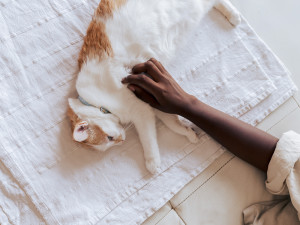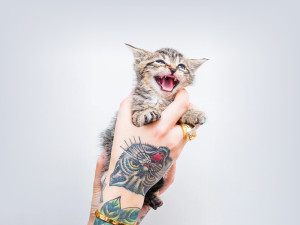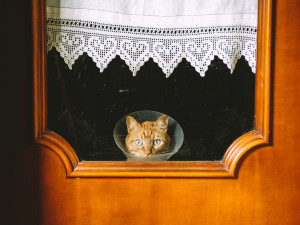Yes, You Should Spay/Neuter Your Cat. Here’s Why
A veterinarian breaks down how it keeps your pet healthy and curbs kitten overpopulation.

Share Article
Peak summer means peak fun for many people. There are breaks from school and work, sunny vacations, and poolside lounging. But it’s also peak kitten season, when there are more kittens than loving homes to care for them. The explosion of new cats on the scene overwhelms shelters, rescue groups, and foster homes. Happy kittens are cute and entertaining, but having an overabundance of homeless kittens is just sad.
So, what can you do to help limit the number of homeless kittens every year? Spay or neuter your cat! Keep reading to learn about having your tom cat neutered to keep him out of trouble and your female feline spayed so she doesn’t have a hot girl summer (Megan Thee Stallion already has that covered).
Why bother getting your cat spayed or neutered?
Getting your cat spayed or neutered has many health and behavioral benefits. The most obvious is that they cannot reproduce and contribute to overpopulation. On a smaller scale, the procedure also benefits the individual cat. Spayed female cats are less likely to develop mammary cancer, the third most common cancer in cats. Spaying early has the greatest benefit.
Studies show that cats spayed before five months of age, specifically before their first heat cycle, are far less likely to develop mammary cancer. Spaying also eliminates the potential for diseases associated with the uterus like dystocia (difficulty giving birth) or pyometra (infection within the uterus), both of which are considered surgical emergencies.

Castrating male cats reduces the likelihood that they’ll get into altercations with other cats over territory or access to potential mates. These scuffles lead to scratch and bite wounds that can spread FIV (Feline Immunodeficiency Virus) and FeLV (Feline Leukemia Virus). FIV is primarily spread through bite wounds; the virus attacks and weakens the immune system, leaving the cat susceptible to many secondary infections.
Just like spaying, early neutering is the way to go since males can reach sexual maturity as early as six months of age. Previously, there was a theory that delaying neutering would decrease the risk of urethral obstructions, but this has since been debunked. Males who are neutered early in life have penises and urethras that are just as large as their intact counterparts. Somebody actually measured this; welcome to the glamorous world of science. Overall, cats that have been spayed/neutered live longer, healthier lives.
What are the behavioral benefits?
In addition to the health benefits above, there are also behavioral benefits. Neutered males are less likely to spray urine to mark their territory. Neutering reduces the desire to roam, and your male cat is less likely to wander about where they can have dangerous encounters with animals or cars.
Spaying prevents the behavioral changes associated with going into “heat,” which intact cats experience multiple times per year. Cats in heat will vocalize, roll around, and rub themselves on everything. They become clingy while also having a fierce desire to be outdoors. Some cats will spray urine in the home to attract potential mates. Sometimes this gesture is successful, and stray males will show up at your doorstep looking for company.
If you’re not familiar with how cats act when they are in heat, it can be quite concerning. Pet owners who are unfamiliar with the process may wonder if their kitty is sick or injured, but these weird behaviors are normal for intact cats. After just one cycle, most cat owners realize that having a cat in heat is just hella annoying.
What happens when a cat is spayed or neutered?
Neutering, or castration, is surgical removal of the testes. The medical term for spay surgery is ovariohysterectomy; “-ectomy” is the surgical removal of body parts, in this case the ovaries and uterus. Both surgeries are performed under general anesthesia, commonly with IV fluids, injectable medications, and close monitoring.
During a spay surgery, the abdomen is shaved and thoroughly cleaned. An incision is made into the abdomen to expose the reproductive organs. The uterus and both ovaries are removed, and the blood vessels that supply these organs are tied off. The incision is closed in multiple layers, then the cat is allowed to recover peacefully from anesthesia. During a neuter, a much smaller incision is made directly over the testes to allow easy removal before skin closure.
Prepping for the big day
Your veterinarian will recommend that your cat is fasted prior to surgery, so no breakfast or snacks are allowed beforehand. This is done to reduce the risk of vomiting and aspirating while sedated. Cats are monitored to ensure a full recovery from anesthesia, and most can go home the same day. Many cats are sent home with pain medication and an e-collar to prevent them from licking or chewing their incision. Though most kitties will want to take it easy for a few days, some try to return to their fast-paced hijinks ASAP, so activity restriction is warranted.
This sounds great. Where do I sign up?
There are plenty of options for where to pursue spay/neuter surgery, and where you go often depends on your preference and budget. Boarded surgeons who perform minimally invasive laparoscopic spays will typically cost more than general practitioners performing routine open surgery. Many organizations offer low-cost spay/neuter clinics. Intact female cats who are unlucky enough to develop uterine infections or pregnancy complications often need emergency spay surgery. Emergency vets will perform this surgery as a life-saving measure, and it is not cheap. The easier route is to prevent unwanted pregnancy and medical problems by spaying or neutering your cat.

Dr. Alycia Washington, DVM, MS
Alycia Washington is a small-animal emergency veterinarian with over 10 years of experience based in North Carolina. She works as a relief veterinarianopens in new tab and provides services to numerous emergency and specialty hospitals. She also works as a veterinary writer with a focus on educating pet parents.
Related articles
![A hand holding a kitten with a cat tattooed at the hand.]()
Heads Up: It’s Officially “Kitten Season”
Hannah Shaw, aka Kitten Lady, on how you can care for orphaned kittens this spring.
![cat with cone after vet visit]()
How Often Should You Take Your Cat to the Vet?
Get thy cat to a vet, even if it’s a struggle to get them out the door.
![Sterling "Trapking" feeding a treat to an orange rescue cat]()
Sterling “TrapKing” Davis is Going Global
The rapper-turned-trapper quit his music career to start a cat rescue, has saved the lives of thousands of strays, and is promoting diversity in the animal welfare world. This spring, he’s taking things international.
![A cat with blue eyes standing before a door entrance.]()
How TNR Is Helping Outdoor Cats
Trap-Neuter-Return is the most humane way to keep stray cat populations in check. Here’s how it works.






